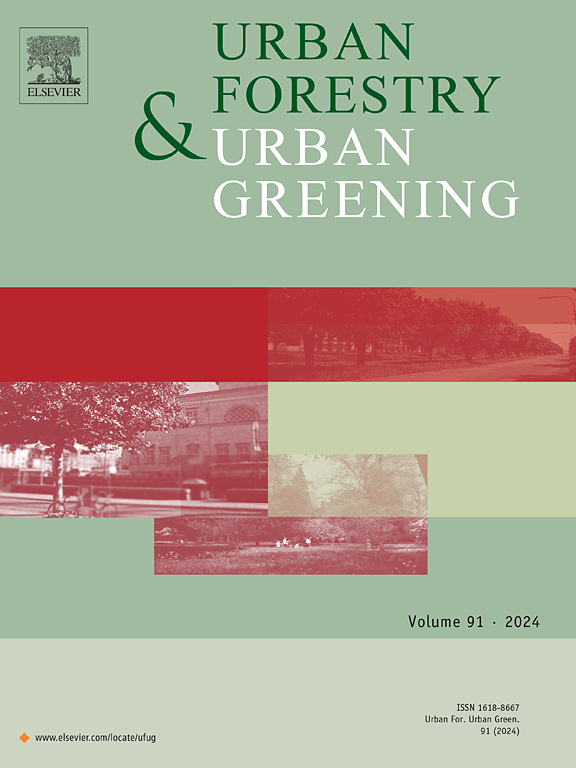The case for urban agriculture: Opportunities for sustainable development
IF 6
2区 环境科学与生态学
Q1 ENVIRONMENTAL STUDIES
引用次数: 0
Abstract
This review examines the potential role of urban agriculture – the practice of farming within and around cities and densely populated areas – in addressing the pressing challenge of sustainable development, correlated to the United Nations Sustainable Development Goals (SDGs). As a set of 17 interconnected goals designed to guide action towards a sustainable and equitable future, the SDGs represent a call to action for all countries and highlight the most pressing challenges and opportunities of today. In recognising that the function and impacts of sustainably and equitably feeding the world’s population are inherent to many of the goals, an interrogation of literature about food supply from within the urban environment (where most people live) has been conducted to support the research aim of considering urban agriculture as a strategy to help achieve urban sustainability and resilience goals. Through a narrative review approach this novel investigation extends beyond the constraints of narrow SDG-centric literature to sustainable development more broadly, finding that urban agriculture is highly valued for its ability to strengthen local food systems and its ecosystem service contributions to urban sustainability, along with socio-cultural attributes. This review depicts practices, highlights multifarious benefits, and features potential perverse outcomes and considerations; in the process identifying that the strongest and deepest connections between urban agriculture and sustainable development are with three specific goals: SDG 2 (Zero Hunger), SDG 11 (Sustainable Cities and Communities), and SDG 12 (Responsible Consumption and Production). Accordingly, the insights gleaned from this narrative review have been structured to reflect the connections with these three SDGs and related to the human- and systems-centric themes of People and Planet. Overall, sensitively applied urban agriculture can strengthen food security, reduce the overall impact of cities, and contribute to the circularity of production and consumption systems, helping to achieve global sustainable development aims.
城市农业的案例:可持续发展的机遇
本综述探讨了城市农业(城市和人口密集地区内部及周边的农业实践)在应对与联合国可持续发展目标(sdg)相关的可持续发展紧迫挑战方面的潜在作用。可持续发展目标包含17个相互关联的目标,旨在指导各国采取行动,实现可持续和公平的未来。可持续发展目标呼吁所有国家采取行动,突出当今最紧迫的挑战和机遇。认识到可持续和公平地为世界人口提供食物的功能和影响是许多目标所固有的,对城市环境(大多数人居住的地方)内食物供应的文献进行了讯问,以支持将城市农业视为帮助实现城市可持续性和弹性目标的战略的研究目标。通过一种叙事回顾的方法,这项新颖的调查超越了以可持续发展目标为中心的狭隘文献的限制,扩展到更广泛的可持续发展,发现城市农业因其加强当地粮食系统和生态系统服务对城市可持续性的贡献以及社会文化属性而受到高度重视。这篇综述描述了实践,强调了各种好处,并介绍了潜在的不良后果和考虑因素;在这一过程中,我们认识到城市农业与可持续发展之间最密切和最深刻的联系与三个具体目标有关:可持续发展目标2(零饥饿)、可持续发展目标11(可持续城市和社区)和可持续发展目标12(负责任的消费和生产)。因此,从这一叙述性回顾中收集到的见解的结构反映了与这三个可持续发展目标的联系,并与以人类和系统为中心的“人与地球”主题相关。总体而言,敏感应用的城市农业可以加强粮食安全,减少城市的总体影响,促进生产和消费系统的循环,有助于实现全球可持续发展目标。
本文章由计算机程序翻译,如有差异,请以英文原文为准。
求助全文
约1分钟内获得全文
求助全文
来源期刊

Urban Forestry & Urban Greening
FORESTRY-
CiteScore
11.70
自引率
12.50%
发文量
289
审稿时长
70 days
期刊介绍:
Urban Forestry and Urban Greening is a refereed, international journal aimed at presenting high-quality research with urban and peri-urban woody and non-woody vegetation and its use, planning, design, establishment and management as its main topics. Urban Forestry and Urban Greening concentrates on all tree-dominated (as joint together in the urban forest) as well as other green resources in and around urban areas, such as woodlands, public and private urban parks and gardens, urban nature areas, street tree and square plantations, botanical gardens and cemeteries.
The journal welcomes basic and applied research papers, as well as review papers and short communications. Contributions should focus on one or more of the following aspects:
-Form and functions of urban forests and other vegetation, including aspects of urban ecology.
-Policy-making, planning and design related to urban forests and other vegetation.
-Selection and establishment of tree resources and other vegetation for urban environments.
-Management of urban forests and other vegetation.
Original contributions of a high academic standard are invited from a wide range of disciplines and fields, including forestry, biology, horticulture, arboriculture, landscape ecology, pathology, soil science, hydrology, landscape architecture, landscape planning, urban planning and design, economics, sociology, environmental psychology, public health, and education.
 求助内容:
求助内容: 应助结果提醒方式:
应助结果提醒方式:


